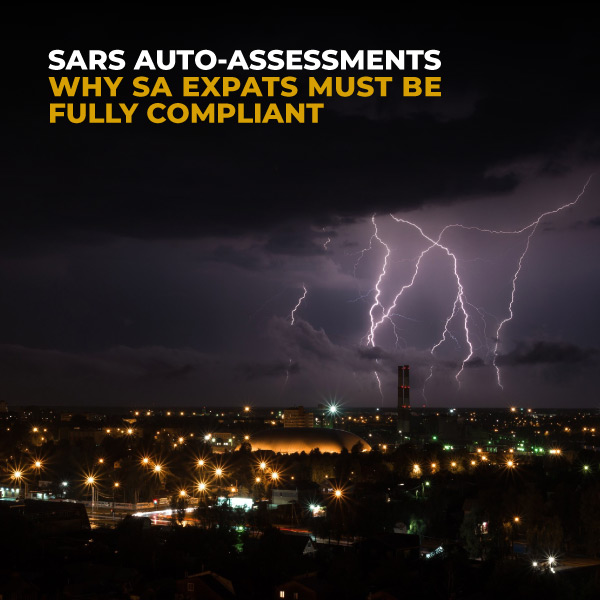SARS NEW AUTO-ASSESSMENTS
WHY SOUTH AFRICAN EXPATRIATES MUST BE FULLY COMPLIANT
With the effects of COVID-19 hitting the National Treasury where it hurts the most, in the pocket; SARS has introduced auto-assessments. This means tax returns will be completed automatically on behalf of the taxpayers using third-party information.
How will it work?
From August this year, SARS has announced that they will be providing a significant number of taxpayers with a “proposed [tax] assessment without the need to file a tax return”. SARS has indicated that they “will source from third parties such as banks, employers, financial service companies who administer retirement funds, pension schemes and medical savings and insurance schemes”. This, according to SARS, will make them confident that the tax return will be done “more accurately than ever”.
The taxpayer would then have the option to edit their return from 1 September 2020 onwards, where they disagree with the SARS auto assessment.
Expatriates beware
Expatriate taxpayers who dread filing season and the admin involved may well think this an easy solution. However, they must be particularly weary and avoid being too quick to accept the auto-assessment, as missing information is normally an automatic SARS audit trigger.
With a major shortfall in revenue collection anticipated for the 2020/2021 tax year and a deteriorating tax base, SARS will be looking into untapped pools of potential revenue. With the expatriate tax law taking effect as of 1 March 2020, and the first “expat tax” provisional payment being due in August 2020, expatriates know that SARS are looking at their compliance as extra revenue. Notable, SARS has now created a “Foreign Employment” team focused on South Africans working abroad.
SARS “auto-assessments” for expatriates will seldomly be correct
Expatriates that work for foreign employers would not have an IRP5 completed in their tax return. Therefore, information relating to their foreign employment income would not form a part of the auto-assessment. Consequently, the auto-assessment would be patently incorrect.
This should ring major alarm bells to expatriate taxpayers who think they will just accept the auto-assessment. The law is clear that the ultimate responsibility of compliance remains that of the taxpayer and not SARS, so where the taxpayer has not seen to correct editing, they are exposed to SARS audits, penalties and criminal sanctions.
Dangers of third-party information for expatriates
The automatic reporting of accurate third-party information and population on a tax return, will be the fat lady singing for many non-compliant taxpayers. This will simply be as the tax return will not make sense for the non-compliant, i.e. how does a taxpayer have interest, investments, paid medical aid etc., where there is not income disclosed to explain these investments and expenses?
These are markers for an automatic audit trigger, as the third-party information should be explainable with reference to the current year’s income disclosure. The prudent SARS auditor would perhaps also have a peak at the prior year income tax return disclosure to see of there is a consistent pattern or explanation for the investments and bank transfers of the expatriate. Whichever way, the auto-assessment process will highlight tax compliance anomalies.
SARS can go back 5 years or longer
Audits require the taxpayer to furnish SARS with information and material as so requested, dated as far back as five (5) years before the current tax year of assessment. The Tax Administration Act further allows SARS to disregard the concept of prescription where there is an amount that has not been assessed for tax due to fraud, misrepresentation or non-disclosure of material facts by the taxpayer.
In practice, it has been identified that expatriates have been grossly non-compliant with some not submitting any tax returns at all, despite having the legal obligation to do so, and others simply not having declared their foreign income earned over the years. With SARS having access to information from “third parties” such as banks, SARS can easily call for bank statements in order to verify if those who declare their foreign earnings do so correctly, and also identify those who fail to do so.
Make things right
It remains imperative for expatriates to take active steps, ensuring they are compliant before a SARS tax audit commences.
Tax practitioners can perform a “tax diagnostic” which will reveal any inconsistences and areas of non-compliance based on the taxpayer’s circumstances and profile. This is a no-risk and non-intrusive process to safely see what SARS sees on your profile and let an expert revert on what a SARS auditor would see. This can then be used to address non-compliance as well as any tax planning process needed.
The SARS Voluntary Disclosure Programme remains the only legal means to prevent being prosecuted from past mistakes or non-compliance. This should ideally be done through a tax attorney who offers legal privilege and specialises in this process.
Conclusion
The expectation is that SARS will be for the coming years under too much collection pressure to start initiatives which will not deliver quick results and ensure that everyone makes full tax disclosure and pays their correct taxes. The auto-assessment process with automatic third-party information is a critical cog in the wheel of identifying and stamping out non-compliance.
AUTHOR

Reabetswe Moloi
Admitted Attorney



